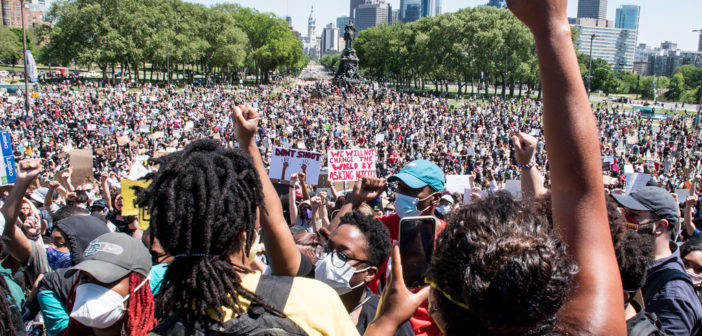At Encompass we work daily to bring a racial justice lens to the animal protection movement because we know that moments of societal racial unrest are not the only times to stand up and fight for Black lives. Racism is embedded into every aspect of society, including nonprofit workplaces. Racism is a part of the air we breathe and we need to be proactive, strategic, and intentional about dismantling it.
We have been heartened to see many animal protection advocates, organizations—and even some plant-based food companies—making public statements in support of the #BlackLivesMatter movement, against structural racism, racial inequity, police brutality, and more. However, we need to go beyond public statements. We need to challenge the ubiquitous “stand in solidarity” trope and become proactive—not merely reactive—against systemic racism.
Statements of solidarity are certainly needed, but where change actually happens is when racial equity work becomes integrated into our movement, our workplaces, and society. We can start with animal protection organizations.
We invite all animal protection groups and advocates to also engage in introspection and self-examination. We invite groups and advocates to learn, believe, and value the racial experiences of marginalized groups as the more accurate version of the truth they represent. And we invite groups and advocates to take every action in their power to dismantle racism every single day—not just during moments of widespread protest
To our colleagues of the global majority, Encompass works to build racial equity in the animal movement. Our Caucus is an affinity group for anyone who identifies as Black, Brown, Indigenous, Asian and Pacific Islander folks, and those who are mixed. We work to build community, engage in healing, and promote our careers. Please join us!
To our white colleagues who work at animal protection groups, who are trying to make sense of this, and who want to take action, we encourage you to take definitive steps beyond posting public statements. Encompass can support you in that journey. To be clear, this journey involves meaningful involvement, a willingness to be uncomfortable, and a commitment to expend resources, including time and money.
White folks, this is your time to step up. We need you to be more than non-racist, we need you to be anti-racist, for non-racism doesn’t stop racism; anti-racism does. There is much anti-racism work we can engage with right here, right now, with you and your organizations. We expect you to make long-term personal and professional commitments to become involved in anti-racist work so that we can dismantle this system of oppression that damages us all, and replace it with an equitable society where everyone’s needs are met.
Nonprofits, please contact us if you’d like to schedule an intake to discuss how to operationalize racial equity at your organization.
White folks, please learn more via our resource guide, a listicle we created on 8 ways white folks can support people of color, and spend some time understanding why people of color and white folks think about race differently in this post.
Featured image: a protest in the wake of the murder of George Floyd. Image via Encompass.






1 Comment
I’m a person of color, poor (despite multiple university degrees), non-heterosexual, older, and, have been for the past thirty years a vegan advocate of both animal and (broader) ecological rights. I don’t share any of that out of undue pride. Instead, it humbles me that, a member of so many alienated and stigmatized groups, I’ve witnessed–am still witnessing–regularly bigotry in each sub-group against OTHERS. I agree with this article’s author that animal rights/protections groups ought to be proactively anti-racist, but having sat on three animal rights groups’ boards and having participated in more rallies and protests on five continents than I can count, I no longer expect animal or ecological rights groups to be any more immune to bigotry than the rest of society. While the alienation and disenfranchisement in our communities are often more subtle than what’s experienced elsewhere, they persist nonetheless.
The most disheartening realization I’ve had to come to terms with over decades engaging others who, in the face of mountains of evidence about the kinds of harms our species inflicts on other self-aware, sensitive beings by the billions, shamelessly assert that they enjoy exploiting other beings, is simply that people don’t HAVE to care about the same things. There are many people who embrace things others find abhorrent. Nor does “education” necessarily change this. Hence the continuance of animal cruelty, ecological devastation, and other harms, like human-on-human bigotry. But I’m deeply thankful for people who do commit to doing as little harm as possible.